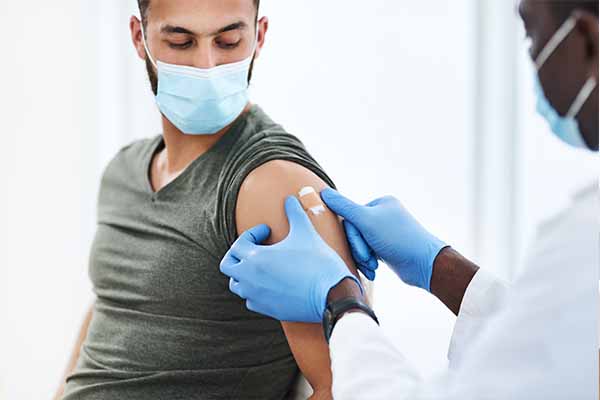
This material is designed to help you talk to your patients and help them understand the benefits of vaccines. Find printable infographics and helpful videos for your patients on the Texas Medical Association’s Talk to Your Patients About … webpage and through Vaccines Defend What Matters, TMA’s integrated, multimedia public health education and advocacy effort.
Catching COVID-19 can provide people with a degree of immunity from being reinfected with the disease in the future. This prompts some to opt against vaccination and instead risk getting sick to obtain this “natural immunity” on the assumption they will get a mild case, and it will protect them from future illness.
“Natural disease does provide some protection,” said David Lakey, MD, an infectious disease expert who is a member of the Texas Medical Association’s COVID-19 Task Force and vice chancellor for health affairs and chief medical officer at The University of Texas System. “The challenge is, it’s not a safe way to get that protection [from infection] because you don’t know if you’re going to have a mild or asymptomatic disease or have a life-threatening disease.”
Among people who’ve already had COVID-19, those who do not get vaccinated after their recovery are more than two times as likely to get COVID again as those who get fully vaccinated, according to a study in the Centers for Disease Control and Prevention’s Aug. 13, 2021, Morbidity and Mortality Weekly Report.
The level of immunity people get from a COVID-19 infection can vary considerably depending on factors like their age or how sick they were, CDC says.
“Vaccination is more predictable about the type of immune response that you’ll get,” Dr. Lakey said.
People who’ve been sick with COVID-19 and afterwards receive a vaccine likely have the highest level of immune protection, he says. But it’s still best for people to be vaccinated before they’re ill to keep from spreading the virus to others.
“[Getting sick with COVID] may just result in a runny nose. But it may be that you spread that to your loved ones and cause significant disease,” Dr. Lakey warned.
Which is safer for building immunity – getting a COVID-19 vaccine or getting sick with the disease?
Taking the vaccine is much safter. Getting ill with COVID-19 is risky. The disease may create no symptoms, make you mildly ill, or it could kill you. Also, people who get COVID sometimes get long-term symptoms, known as long COVID. These can affect a person’s lungs, heart, brain, and other major organs for life. The COVID-19 vaccines are designed to protect you against the disease without making you sick.
Is vaccine immunity as good as natural immunity?
Vaccine immunity is better than natural immunity with COVID-19 because it’s more predictable. People who get sick with COVID-19 may have strong immunity or they may not, depending in part on how sick they were or how old they are, for instance. COVID-19 vaccines deliver consistently strong immunity for most people.
Should I get vaccinated if I’ve already been sick with COVID-19?
Yes. People who get sick with COVID-19 can get sick with it again. In many cases, their second illness is worse than the first. Although getting sick with COVID-19 plus getting vaccinated provides strong protection against the disease, early vaccination helps protect those around you as well.
Some people can’t get vaccinated. Should they rely on natural immunity?
No. The widespread use of vaccines is our best protection because vaccines work in two ways. First, they protect most vaccinated people from the illness. Second, as more people in an area get vaccinated, the disease cannot spread easily. The number of new infections drops. This protects even the people who can’t get vaccinated if, for example, they have a weakened immune system. They are being protected by “herd” or “community” immunity. That means so many people are vaccinated that the virus finds it difficult or impossible to spread. People who cannot take a COVID vaccine also can protect themselves with Evusheld, a medication that helps prevent infection.
Sources: David Lakey, MD; Centers for Disease Control and Prevention